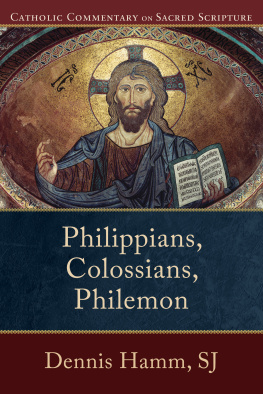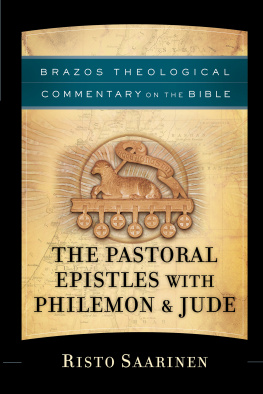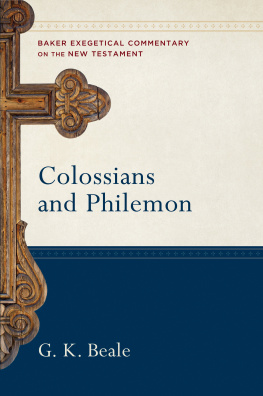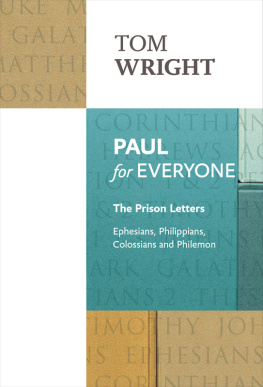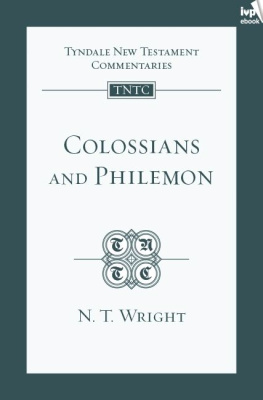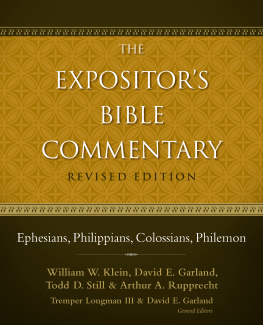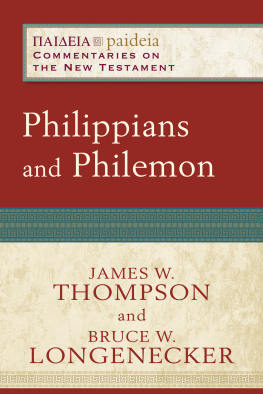Dennis SJ Hamm - Philippians, Colossians, Philemon
Here you can read online Dennis SJ Hamm - Philippians, Colossians, Philemon full text of the book (entire story) in english for free. Download pdf and epub, get meaning, cover and reviews about this ebook. year: 2013, publisher: Baker Publishing Group, genre: Religion. Description of the work, (preface) as well as reviews are available. Best literature library LitArk.com created for fans of good reading and offers a wide selection of genres:
Romance novel
Science fiction
Adventure
Detective
Science
History
Home and family
Prose
Art
Politics
Computer
Non-fiction
Religion
Business
Children
Humor
Choose a favorite category and find really read worthwhile books. Enjoy immersion in the world of imagination, feel the emotions of the characters or learn something new for yourself, make an fascinating discovery.
- Book:Philippians, Colossians, Philemon
- Author:
- Publisher:Baker Publishing Group
- Genre:
- Year:2013
- Rating:4 / 5
- Favourites:Add to favourites
- Your mark:
- 80
- 1
- 2
- 3
- 4
- 5
Philippians, Colossians, Philemon: summary, description and annotation
We offer to read an annotation, description, summary or preface (depends on what the author of the book "Philippians, Colossians, Philemon" wrote himself). If you haven't found the necessary information about the book — write in the comments, we will try to find it.
Philippians, Colossians, Philemon — read online for free the complete book (whole text) full work
Below is the text of the book, divided by pages. System saving the place of the last page read, allows you to conveniently read the book "Philippians, Colossians, Philemon" online for free, without having to search again every time where you left off. Put a bookmark, and you can go to the page where you finished reading at any time.
Font size:
Interval:
Bookmark:

Catholic Commentary on Sacred Scripture
S ERIES E DITORS
Peter S. Williamson
Mary Healy
A SSOCIATE E DITOR
Kevin Perrotta
C ONSULTING E DITORS
Scott Hahn , Franciscan University of Steubenville
Daniel J. Harrington, SJ , Weston Jesuit School of Theology
William S. Kurz, SJ , Marquette University
Francis Martin , Dominican House of Studies
Frank J. Matera , Catholic University of America
George Montague, SM , St. Marys University
Terrence Prendergast, SJ , Archbishop of Ottawa
2013 by Dennis Hamm, SJ
Published by Baker Academic
a division of Baker Publishing Group
P.O. Box 6287, Grand Rapids, MI 49516-6287
www . bakeracademic . com
Ebook edition created 2013
Ebook corrections 04.02.2014, 01.26.2021
All rights reserved. No part of this publication may be reproduced, stored in a retrieval system, or transmitted in any form or by any meansfor example, electronic, photocopy, recordingwithout the prior written permission of the publisher. The only exception is brief quotations in printed reviews.
Library of Congress Cataloging-in-Publication Data is on file at the Library of Congress, Washington, DC.
ISBN 978-1-4412-4486-4
Nihil obstat:
Rev. Lam T. Le, STL
Censor Deputatus
January 30, 2013
Imprimatur:
Most Rev. Walter A. Hurley, DD
Bishop of Grand Rapids
February 28, 2013
The nihil obstat and imprimatur are official declarations that a book or pamphlet is free of doctrinal or moral error. There is no implication that those who have granted the nihil obstat or the imprimatur agree with the content, opinions, or statements expressed therein.
Scripture quotations are from the New American Bible, Revised Edition 1970, 1986, 1991, 2011 Confraternity of Christian Doctrine, Washington, DC, and are used by permission of the copyright owner. All rights reserved. No part of the New American Bible may be reproduced in any form without permission in writing from the copyright owner.
Cover
Series Page
Title Page
Copyright Page
Illustrations
Editors Preface
Abbreviations
Introduction to the Prison Letters
Pauls Letter to Philemon
Outline of Pauls Letter to Philemon
Pauls Letter to Philemon and Everyone Else at His House
Pauls Letter to the Christians in Philippi
Outline of the Letter to the Philippians
Chiastic Outline of the Letter to the Philippians
Greeting, Thanksgiving, and Joyful Intercession
The Example of Paul in Chains
A Call to Conduct Worthy of the Gospel
The Best Example of All: Christs Self-Emptying Love and Service
Paul Applies the Example to Christian Living
Two More Examples: Timothy and Epaphroditus
The Example of Pauls Faithful Citizenship in Christ
A Final Call to Unity and Joy
Thanks and Final Greetings
Pauls Letter to the Christians in Colossae
Outline of the Letter to the Colossians
Greeting, Thanks to the Father, and Prayer
Beloved Son of the Father, Head and Redeemer of All
Paul Rejoices in His Ministry to the Gentiles
You Have Died and Been Raised with Christ
Let the Peace of Christ Rule in Your Hearts
Work for the Lord and Not for Human Beings
A Request for Prayer
Commendations, Greetings, and Blessing
Suggested Resources
Glossary
Index of Pastoral Topics
Index of Sidebars
Map
Notes
Back Cover
Figure 1. Saul/Pauls conversion
Figure 2. Denarius coin
Figure 3. Papyrus
Figure 4. Roman home
Figure 5. Cast of a slave
Figure 6. Forum of Philippi
Figure 7. Painting of Christ crucified
Figure 8. Ancient latrine
Figure 9. Three Colossian churches
Figure 10. Roman soldiers
The Church has always venerated the divine Scriptures just as she venerates the body of the Lord.... All the preaching of the Church should be nourished and governed by Sacred Scripture. For in the sacred books, the Father who is in heaven meets His children with great love and speaks with them; and the power and goodness in the word of God is so great that it stands as the support and energy of the Church, the strength of faith for her sons and daughters, the food of the soul, a pure and perennial fountain of spiritual life.
Second Vatican Council, Dei Verbum 21
Were not our hearts burning [within us] while he spoke to us on the way and opened the scriptures to us?
Luke 24:32
The Catholic Commentary on Sacred Scripture aims to serve the ministry of the Word of God in the life and mission of the Church. Since Vatican Council II, there has been an increasing hunger among Catholics to study Scripture in depth and in a way that reveals its relationship to liturgy, evangelization, catechesis, theology, and personal and communal life. This series responds to that desire by providing accessible yet substantive commentary on each book of the New Testament, drawn from the best of contemporary biblical scholarship as well as the rich treasury of the Churchs tradition. These volumes seek to offer scholarship illumined by faith, in the conviction that the ultimate aim of biblical interpretation is to discover what God has revealed and is still speaking through the sacred text. Central to our approach are the principles taught by Vatican II: first, the use of historical and literary methods to discern what the biblical authors intended to express; second, prayerful theological reflection to understand the sacred text in accord with the same Spirit by whom it was writtenthat is, in light of the content and unity of the whole Scripture, the living tradition of the Church, and the analogy of faith ( Dei Verbum 12).
The Catholic Commentary on Sacred Scripture is written for those engaged in or training for pastoral ministry and others interested in studying Scripture to understand their faith more deeply, to nourish their spiritual life, or to share the good news with others. With this in mind, the authors focus on the meaning of the text for faith and life rather than on the technical questions that occupy scholars, and they explain the Bible in ordinary language that does not require translation for preaching and catechesis. Although this series is written from the perspective of Catholic faith, its authors draw on the interpretation of Protestant and Orthodox scholars and hope these volumes will serve Christians of other traditions as well.
A variety of features are designed to make the commentary as useful as possible. Each volume includes the biblical text of the New American Bible, Revised Edition (NABRE), the translation approved for liturgical use in the United States. In order to serve readers who use other translations, the most important differences between the NABRE and other widely used translations (RSV, NRSV, JB, NJB, and NIV) are noted and explained. Each unit of the biblical text is followed by a list of references to relevant Scripture passages, Catechism sections, and uses in the Roman Lectionary. The exegesis that follows aims to explain in a clear and engaging way the meaning of the text in its original historical context as well as its perennial meaning for Christians. Reflection and Application sections help readers apply Scripture to Christian life today by responding to questions that the text raises, offering spiritual interpretations drawn from Christian tradition, or providing suggestions for the use of the biblical text in catechesis, preaching, or other forms of pastoral ministry.
Font size:
Interval:
Bookmark:
Similar books «Philippians, Colossians, Philemon»
Look at similar books to Philippians, Colossians, Philemon. We have selected literature similar in name and meaning in the hope of providing readers with more options to find new, interesting, not yet read works.
Discussion, reviews of the book Philippians, Colossians, Philemon and just readers' own opinions. Leave your comments, write what you think about the work, its meaning or the main characters. Specify what exactly you liked and what you didn't like, and why you think so.

